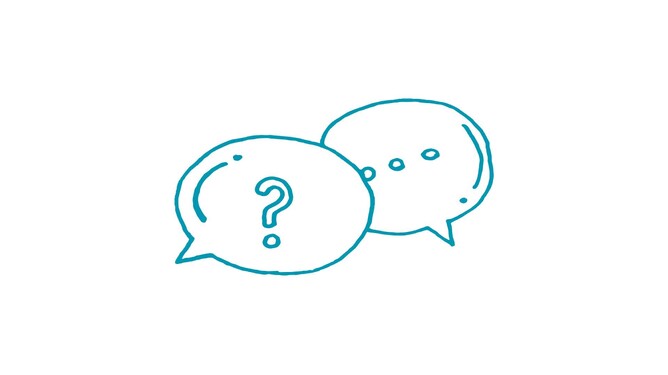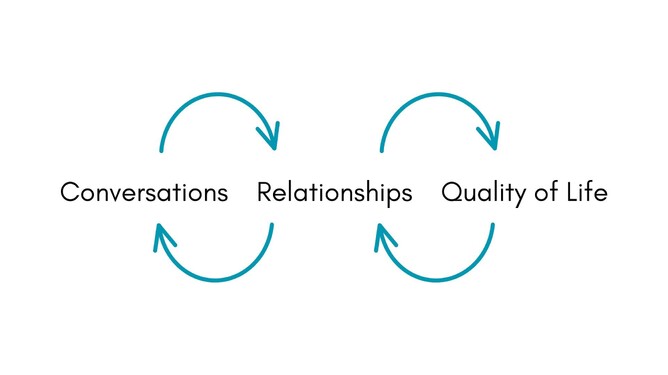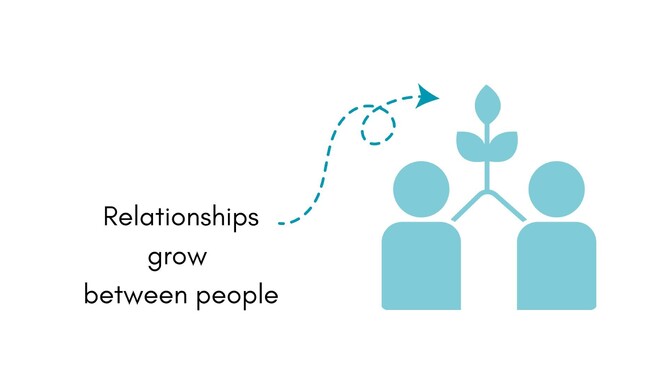As a young athlete, I thought I needed to be friends with my teammates. I was friendly with everyone, but I struggled with the idea of having to establish close friendships with them all. How was I supposed to make this work? It took me a while, but eventually, I realised that what teams need is not necessarily friendship (though it is a nice bonus when that happens), but trust and respect. And to build those, you need time and patience.
And you need conversations.
Years later, working as a teacher, I came across a phrase that captured in such simplicity what had taken me ages to work out:
The conversation is the relationship*.
That’s it. Simple.
It’s one of the most powerful concepts I’ve come across. It has shaped how I have conversations in my personal and professional life. And I use it often in my coaching.
Let me explain: Each conversation we have with someone reflects the kind of relationship we have with that person. For example, if your conversations with your friends are full of care, laughter and attention, your relationships with them are likely full of care, laughter and attention, too. If your conversation with someone is usually superficial, passive-aggressive, or boring, your relationship with them is likely too. If your conversation is full of hesitation, angst, and dread, chances are your relationship with that person is too. If you don’t have conversations with someone… Do you actually have a relationship with them at all?
You get the idea.
I find it’s a useful way of looking at our relationships. It is also the most effective way I know to change or influence your relationship with someone: one conversation at a time.
Building trust takes time. Consequently, building relationships takes time. If you want to change a relationship with someone, think about how you can change your conversations with them. I have shared this concept with coaches, teachers, clients, and high-performance athletes. Many have found it a useful way of thinking about their relationships and it has helped them be deliberate about the conversations they have with people in their lives.
There is a bigger picture to this too. If we zoom out for a second, it is worth noting that our perception of our quality of life is significantly shaped by how we perceive the quality of our relationships². If, for example, one of your key relationships is put under strain, say with a parent, your partner, child, or close friend or relative, this likely influences how you perceive your overall quality of life. And the dark cloud that might temporarily or permanently hang over that relationship, clouds your experience of everything else. Equally, if your relationships are thriving and you experience them as fulfilling, trusting, and caring, this will spill over into your experience of the rest of your life.
Now, if we work backwards, we can see a powerful connection: If your quality of life is dependent on the quality of your relationships and the quality of your relationships depends on the quality of your conversations, then you can influence the quality of your life by improving the quality of your conversations.
Often, people’s go-to approach when they want to improve a relationship is to be ‘nice’. While the intention behind that is good, I think it is more useful to think about what you would like that relationship to look like and then shape your conversation accordingly. For example, if you want to create a professional relationship with someone, stick to professional language, only communicate at times that are professionally acceptable within your business and industry, and stick to topics that are relevant to you both in your professional realm. If, however, you want to get to know someone or you want to create a caring relationship, show your love and care in your language, in the way you listen, and in your actions. With that, you can avoid fake niceties and instead act in line with what you want the relationship to look like.
And go slow. Building relationships takes time, especially if you want them to be of good quality.
I guess I should say something about hard conversations too. Often we shy away from those because we fear having a hard (read: necessary) conversation may harm the relationship. It shouldn’t. Not discussing topics relevant to your relationship will cause far more damage. Hard conversations can and should contribute to building your relationship with that person.
This concept is powerful because it takes the pressure off. Instead of focusing on the result, the quality of the relationship, you focus on the process, the quality of the conversations. Every interaction you have with someone is an opportunity to build and shape that relationship in the way you want. Not every conversation you ever have will influence the quality of your life or change your life, but every conversation has the potential to. I think this is a pretty cool way of looking at conversations.
I have been writing about conversations, and perhaps you have pictured face-to-face interactions. While these are my favourite, and I think they are one of the most powerful ways to connect, I also know that it is not realistic to have every conversation in person. But, of course, we have conversations using all sorts of channels: txt, WhatsApp, DMs, email, phone calls, video calls, etc. You can still influence your relationships using those. Whatever medium you choose, people still notice how you interact, whether or not you respond, and what actions you take as a result of conversations you have had.
Naturally, it is also reasonable to deliberately use your conversations to create more distance between you and another person if you don’t want a close relationship with them. If you want your relationship to remain professional rather than personal, or if you prefer to keep it distant, shape your conversations like that.
Remember: you own only 50% of your relationships, because relationships are what happens between people. Thus, they can’t be one person’s responsibility. You influence your 50%.
Just one last thought: whenever you are unsure whether or how to have a hard or necessary conversation, consider the cost of not having the conversation at all. How would not having the conversation influence the relationship? And how do you feel about that? And what happens if you don’t have a conversation about something small, but important, right now? Will this blow up and become something massive in a few months?
Brené Brown is one of the people whose research and work I am interested in. And to quote her, ‘Clear is kind.’³ So be clear with yourself about the kind of relationships you want and the kinds of conversations that will require. And be clear with others too, for it never hurts to be kind.
I think young-athlete me would have appreciated knowing this. And I think it would have taken some pressure off knowing I didn't need close friendships to be a good teammate; and that I could be deliberate about the kind of relationships I want and need with different people. I found it super helpful as a teacher and I find it helpful now, as a coach.
Do I get it right every time and with everyone? Nope. But that doesn't stop me from trying. And it shouldn't stop you either. ...There is always the next conversation.
I'm hoping some of this was new food for thought. Thank you for taking the time to read it all.
Take care & I'll be back with another idea or concept soon.
Tina
Ps. If you found this useful, I'd love to hear from you. And, if you think this idea might resonate with someone else, please share it. Maybe even in a conversation...
Key points:
The conversations you have reflect the relationships you have.
You get to shape your relationships one conversation at a time.
The quality of your relationships impacts how you perceive the quality of your life.
Reflection questions for you:
Think about the conversations you have had this week, at home, at work, etc. In what way have they reflected the relationships you have with these people?
Are there any relationships you would like to shift? How would you approach this in your next conversation with that person?
If you are a leader, a coach, a teacher, etc., what are your conversations with the people you lead, coach, and teach like? Have you created the relationships you need with the people you lead?
Acknowledgements and further reading:
*I first read the phrase ‘The conversation is the relationship’ in Susan Scott’s book Fierce Conversations.
²If you are interested in how our relationships influence how we perceive our quality of life, I recommend you read The Good Life by Marc S. Schulz, Robert J. Waldinger.
³Brené Brown uses this phrase in a range of her publications. I first read it in Dare to Lead.




